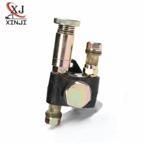Information injection-pump assembly
ZEXEL
101602-7510
1016027510
ISUZU
1156028080
1156028080
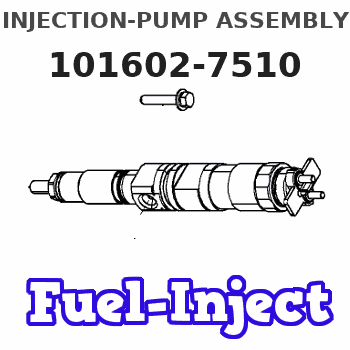
Rating:
Service parts 101602-7510 INJECTION-PUMP ASSEMBLY:
1.
_
5.
AUTOM. ADVANCE MECHANIS
6.
COUPLING PLATE
8.
_
9.
_
11.
Nozzle and Holder
8-97022-096-1
12.
Open Pre:MPa(Kqf/cm2)
14.7{150}
15.
NOZZLE SET
Include in #1:
101602-7510
as INJECTION-PUMP ASSEMBLY
Include in #2:
104748-1060
as _
Cross reference number
ZEXEL
101602-7510
1016027510
ISUZU
1156028080
1156028080
Zexel num
Bosch num
Firm num
Name
Calibration Data:
Adjustment conditions
Test oil
1404 Test oil ISO4113 or {SAEJ967d}
1404 Test oil ISO4113 or {SAEJ967d}
Test oil temperature
degC
40
40
45
Nozzle and nozzle holder
105780-8140
Bosch type code
EF8511/9A
Nozzle
105780-0000
Bosch type code
DN12SD12T
Nozzle holder
105780-2080
Bosch type code
EF8511/9
Opening pressure
MPa
17.2
Opening pressure
kgf/cm2
175
Injection pipe
Outer diameter - inner diameter - length (mm) mm 6-2-600
Outer diameter - inner diameter - length (mm) mm 6-2-600
Overflow valve
131424-4920
Overflow valve opening pressure
kPa
127
107
147
Overflow valve opening pressure
kgf/cm2
1.3
1.1
1.5
Tester oil delivery pressure
kPa
157
157
157
Tester oil delivery pressure
kgf/cm2
1.6
1.6
1.6
Direction of rotation (viewed from drive side)
Right R
Right R
Injection timing adjustment
Direction of rotation (viewed from drive side)
Right R
Right R
Injection order
1-5-3-6-
2-4
Pre-stroke
mm
3.6
3.55
3.65
Beginning of injection position
Drive side NO.1
Drive side NO.1
Difference between angles 1
Cal 1-5 deg. 60 59.5 60.5
Cal 1-5 deg. 60 59.5 60.5
Difference between angles 2
Cal 1-3 deg. 120 119.5 120.5
Cal 1-3 deg. 120 119.5 120.5
Difference between angles 3
Cal 1-6 deg. 180 179.5 180.5
Cal 1-6 deg. 180 179.5 180.5
Difference between angles 4
Cyl.1-2 deg. 240 239.5 240.5
Cyl.1-2 deg. 240 239.5 240.5
Difference between angles 5
Cal 1-4 deg. 300 299.5 300.5
Cal 1-4 deg. 300 299.5 300.5
Injection quantity adjustment
Adjusting point
A
Rack position
9.6
Pump speed
r/min
1200
1200
1200
Average injection quantity
mm3/st.
66.6
65.1
68.1
Max. variation between cylinders
%
0
-2
2
Basic
*
Fixing the lever
*
Injection quantity adjustment_02
Adjusting point
-
Rack position
6.8+-0.5
Pump speed
r/min
325
325
325
Average injection quantity
mm3/st.
9.4
8.1
10.7
Max. variation between cylinders
%
0
-14
14
Fixing the rack
*
Remarks
Adjust only variation between cylinders; adjust governor according to governor specifications.
Adjust only variation between cylinders; adjust governor according to governor specifications.
Test data Ex:
Governor adjustment
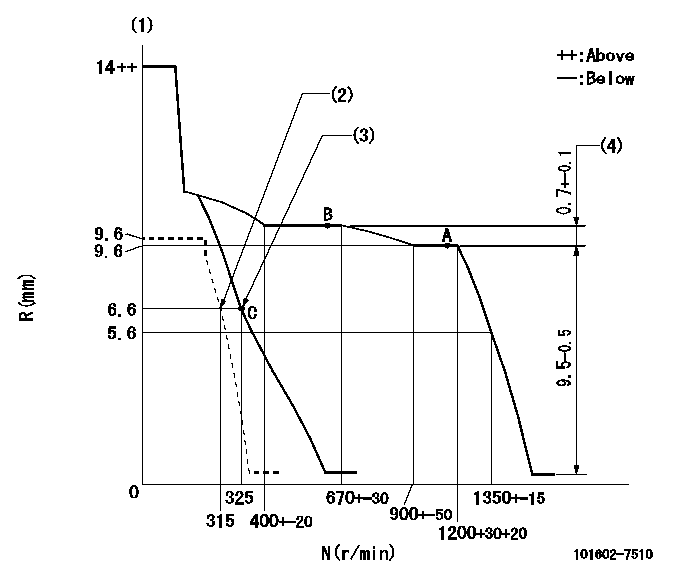
N:Pump speed
R:Rack position (mm)
(1)Target notch: K
(2)Set idle sub-spring
(3)Main spring setting
(4)Rack difference between N = N1 and N = N2
----------
K=14 N1=1200r/min N2=600r/min
----------
----------
K=14 N1=1200r/min N2=600r/min
----------
Speed control lever angle
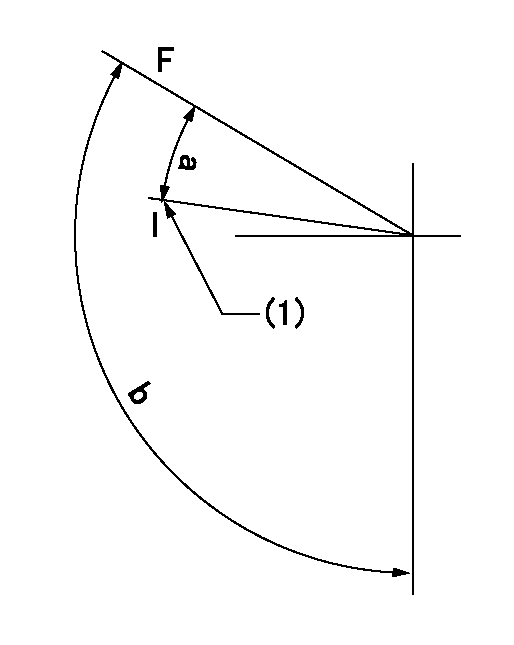
F:Full speed
I:Idle
(1)Stopper bolt setting
----------
----------
a=(116deg)+-5deg b=(24deg)+-5deg
----------
----------
a=(116deg)+-5deg b=(24deg)+-5deg
Stop lever angle
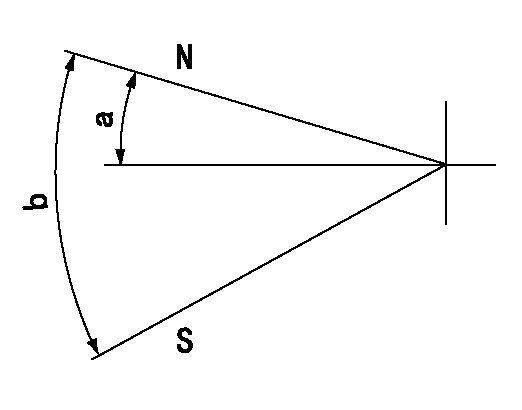
N:Pump normal
S:Stop the pump.
----------
----------
a=12deg+-5deg b=46deg+-5deg
----------
----------
a=12deg+-5deg b=46deg+-5deg
Timing setting
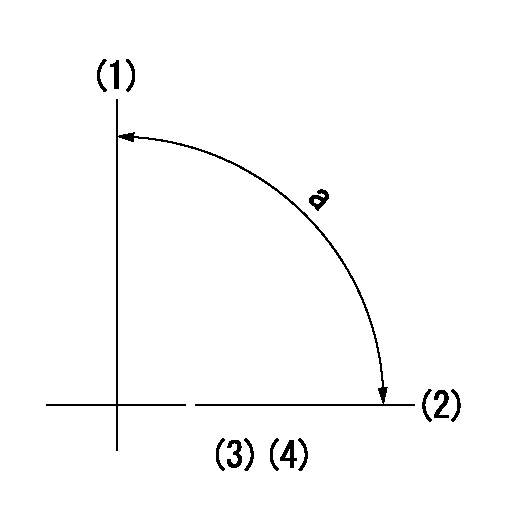
(1)Pump vertical direction
(2)Position of gear mark 'C' at No 1 cylinder's beginning of injection
(3)B.T.D.C.: aa
(4)-
----------
aa=20deg
----------
a=(90deg)
----------
aa=20deg
----------
a=(90deg)
Information:
1. Determining Overhaul Timing
The timing of engine overhauls should be determined primarily in accordance with reductions in compression pressure. A reduction in compression pressure may be accompanied by one or more of the following externally observable symptoms:(a) Reduced power(b) Increased fuel consumption(c) Increased engine-oil consumption(d) Increased blowby gas through breather (possibly owing to wear on cylinder liners and piston rings)(e) Gas leakage (possibly owing to poor seating of intake and exhaust valves)(f) Starting problems(g) Increased engine noise(h) Abnormal exhaust-gas color after engine warmupAlthough these symptoms can be caused by a reduction in compression pressure, they can be caused also by other problems that are not related to engine deterioration. Notably, symptoms (b) and (f) may be affected significantly by the injection pump's injection rate, by the injection timing, by plunger wear, by injector defects, and/or by the battery, starter, and other electrical equipment. Symptoms (d) should be given special attention since a decrease in compression pressure owing to wear on the cylinder liners and piston rings is one of the most obvious signs that the engine needs an overhaul. It is essential, however, to measure the compression pressure in each cylinder and to use the results as the primary criteria for making a decision to overhaul the engine.2. Measuring Compression Pressure
2.1 Preparation for InspectionPerform the following checks before starting the inspection.(1) Make sure the engine oil, air cleaner, starter, and battery are normal.(2) Make sure the engine is warm.2.2 Inspection(1) Move the control lever to the stop position.(2) Remove all glow plugs, then connect the Compression Gauge Adapter (ST333060) and compression gauge to the cylinder whose compression pressure is to be checked.(3) Crank the engine using the starter until the needle of the compression gauge stops moving, then read the pressure indication.(4) If the measurement is lower than the specified limit, perform an overhaul.
(a) Measure the compression pressure of every cylinder. Measuring the compression pressures of two or three cylinders and simply assuming the compression pressures of the other cylinders is dangerous.(b) The compression pressure varies with the engine speed, so it is important to take all measurements with the same engine speed.
Unit: MPa {kgf/cm2} (psi) Take measurements with an engine speed of 240 min-1.
Compression gauge and adapter
Measuring compression pressure
(a) It is important to measure compression pressures regularly and to keep track of changes in them.(b) During the engine's run-in period and after an overhaul, the compression pressures will increase slightly as the piston rings, valve seats, and other parts fit snugly in position. The pressures will then decrease as parts wear.
3. Troubleshooting
3.1 OverviewDiesel-engine fault symptoms tend to have multiple causes, which influence each other. Consequently, it is often difficult to locate a fault based on the symptoms. Particular care is required when diagnosing faults related to the injection pump, injectors, and compression pressures since such faults may produce the same symptoms.For the above-mentioned reasons, the inspection sequences in the troubleshooting charts on the following pages start with items where the likelihood of a fault is greatest with
The timing of engine overhauls should be determined primarily in accordance with reductions in compression pressure. A reduction in compression pressure may be accompanied by one or more of the following externally observable symptoms:(a) Reduced power(b) Increased fuel consumption(c) Increased engine-oil consumption(d) Increased blowby gas through breather (possibly owing to wear on cylinder liners and piston rings)(e) Gas leakage (possibly owing to poor seating of intake and exhaust valves)(f) Starting problems(g) Increased engine noise(h) Abnormal exhaust-gas color after engine warmupAlthough these symptoms can be caused by a reduction in compression pressure, they can be caused also by other problems that are not related to engine deterioration. Notably, symptoms (b) and (f) may be affected significantly by the injection pump's injection rate, by the injection timing, by plunger wear, by injector defects, and/or by the battery, starter, and other electrical equipment. Symptoms (d) should be given special attention since a decrease in compression pressure owing to wear on the cylinder liners and piston rings is one of the most obvious signs that the engine needs an overhaul. It is essential, however, to measure the compression pressure in each cylinder and to use the results as the primary criteria for making a decision to overhaul the engine.2. Measuring Compression Pressure
2.1 Preparation for InspectionPerform the following checks before starting the inspection.(1) Make sure the engine oil, air cleaner, starter, and battery are normal.(2) Make sure the engine is warm.2.2 Inspection(1) Move the control lever to the stop position.(2) Remove all glow plugs, then connect the Compression Gauge Adapter (ST333060) and compression gauge to the cylinder whose compression pressure is to be checked.(3) Crank the engine using the starter until the needle of the compression gauge stops moving, then read the pressure indication.(4) If the measurement is lower than the specified limit, perform an overhaul.
(a) Measure the compression pressure of every cylinder. Measuring the compression pressures of two or three cylinders and simply assuming the compression pressures of the other cylinders is dangerous.(b) The compression pressure varies with the engine speed, so it is important to take all measurements with the same engine speed.
Unit: MPa {kgf/cm2} (psi) Take measurements with an engine speed of 240 min-1.
Compression gauge and adapter
Measuring compression pressure
(a) It is important to measure compression pressures regularly and to keep track of changes in them.(b) During the engine's run-in period and after an overhaul, the compression pressures will increase slightly as the piston rings, valve seats, and other parts fit snugly in position. The pressures will then decrease as parts wear.
3. Troubleshooting
3.1 OverviewDiesel-engine fault symptoms tend to have multiple causes, which influence each other. Consequently, it is often difficult to locate a fault based on the symptoms. Particular care is required when diagnosing faults related to the injection pump, injectors, and compression pressures since such faults may produce the same symptoms.For the above-mentioned reasons, the inspection sequences in the troubleshooting charts on the following pages start with items where the likelihood of a fault is greatest with
